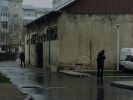Eye For Film >> Movies >> Police Adjective (2009) Film Review
Let us be clear - this is a film about language, semantics to be precise, stunning in ambition if small in scale, literary, langourous - it will not be, is not, for everyone. That's not to be exclusionary, condescending, condemnatory: Police, Adjective is laden with import, semiotic weight. Meaning abounds.
Cristi is a detective, following a young man suspected of dealing drugs. This isn't the bullet-slinging bad-guy bashing of Bad Boys or the instantaneous insight of Sherlock Holmes; this is the grinding tedium of street-level surveillance. Watching from corners, picking up cigarette butts, just hanging around, watching. The detectives are slowly introduced to us. Cristi is young, certain, played with assurance by Dragos Bucur, coming into conflict with his office-mate Nelu, played by Ion Stoica with a distinct weariness and sense of ineptitude. This is Romanian policing in the new style - hand written reports, days of surveillance, arrests for possession of a single joint. Cristi protests that there's nowhere else in Europe that you would be arrested for possession of such small quantities, but his superiors are not concerned.

He might have a case; indeed, it seems on the face of it open and shut against Victor. He's got qualms though, in particular that the tip-off came without any obvious motive from Victor's friend Alex - save perhaps for a girl. A meeting between the Cristi and Victor in a bar is inconclusive, frustrating for both. He's anxious to watch, to wait, to catch someone further up the chain. He avoids his superiors, hoping to buy time. He consults with the prosecutor. He observes and reports, waits, watches, writes. It takes time. He chases thin leads through the bureaucracy of the state, calling in favours, ducking through doorways in the warren-like offices, trying to roll up the chain. He's stymied by several things, but chief among them is language.
This is a police procedural, but it's also about the nature of policing, about the gap between law and justice, the self and the state. Scholars of Gramsci will have a field day with it. This is a film that demands to be approached critically. The cues are obvious enough; Cristi argues with his wife (the excellent Irina Saulescu) about the meaning of a song, she advised him that he made a spelling mistake - the Romanian Academy now recognises "not any" as a negative pronomial adjective rather than a conjunction with an indefinite article - 'nici un' is a single word now. The revelations in Police, Adjective are organic, growing in the loam of what seems like tedium. Enough happens, enough is happening to make the wait worthwhile - more Silent Light than Putty Hill, all building to a decision, a closing line that's heartbreaking.
There are other moments that excel, an almost fractal depth to the characterisation - Corneliu Porumbiu's script is so dense that every word imparts a fragment of meaning; and watching the film subtitled, that textual depth is foregrounded. "Criminals say 'squealed' - we say 'denounced'", the implications of being bad at football, graffiti for Steaua Bucharest and the Chicago Bulls. It wouldn't work in English, it needs the rigidity of State control of language, the traces of State-control of everything - perhaps uniquely Romanian, but also universal.
Other moments are strong because of what amounts to a hyper-realism, Cristi's vantage of the 'criminals' adopted by the camera, any conversation they are having obliterated by the background sounds of football. The lie Cristi tells the attendant at the kiosk he loiters outside, explaining his presence by pretending to be an agent of what we would infer is a failed state, rather than a legitimate authority. Even watching Cristi eat his dinner becomes fascinating, because there is meaning there to acquire. Not a line nor a movement is wasted.
The denouement, the climactic showdown, is a conversation, some 35 minutes of argument with nary a voice raised. A single room, the stern Vlad Ivanov as the Captain, the hapless Nelu and the circles argued with Cristi. No rifles over mantlepieces here, but dictionaries and chalkboards, and for all its stillness striking. The only problem is the need to engage, to invest - this is a 'reading movie' in the sense that it demands interpretation, and for all its weight, for all its talent, its authentic revelations are not new. It's long, nearing the two hour mark, but it uses its time efficiently. It is hard to convey the tedium of repetition without coming dangerously close, but Porumbiu's effort means this film tends only asymptotically towards the boredom threshold, stopping short to stun.
That success will vary with audiences. There's no attempt to be elitist here, it's a simple statement of fact; some people will not enjoy this because of how it sets out to do what it has decided to. Some people will like R more than A Prophet. It is a matter of opinion, of the meaning we extract and invest in text(s). That very obstacle serves to strengthen Police, Adjective's hand - everything has meaning, even if it's something you can't quite put your finger on or are not inclined to touch.
Reviewed on: 02 Jul 2010

















